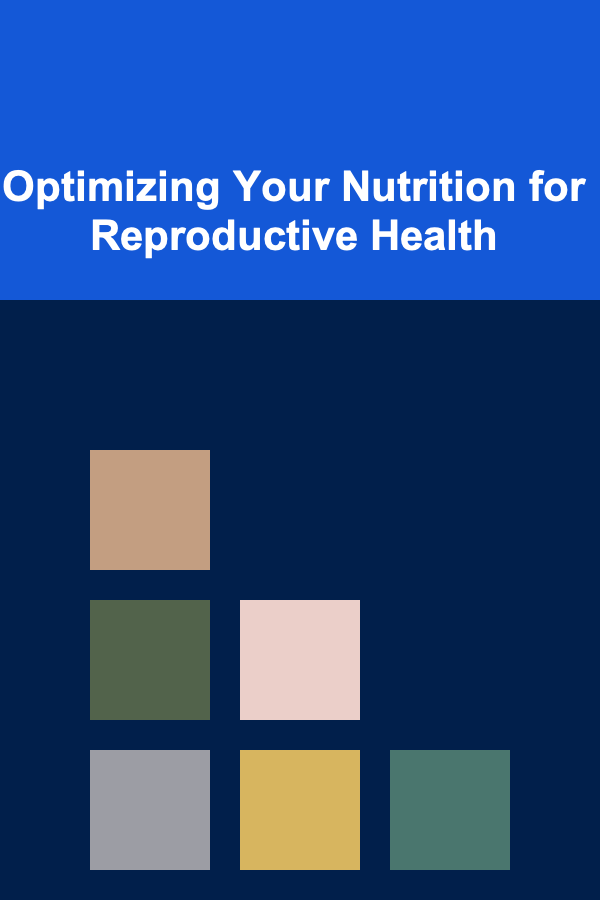
Optimizing Your Nutrition for Reproductive Health
ebook include PDF & Audio bundle (Micro Guide)
$12.99$6.99
Limited Time Offer! Order within the next:

Reproductive health is a critical aspect of overall well-being for both men and women. While genetics and lifestyle factors play significant roles, nutrition is a cornerstone that profoundly influences fertility, pregnancy outcomes, and the overall health of the reproductive system. This article delves into the intricate relationship between nutrition and reproductive health, providing a comprehensive guide to optimizing your dietary intake to support fertility, healthy pregnancies, and long-term reproductive well-being.
Understanding the Link Between Nutrition and Reproductive Health
The food we consume acts as the building blocks for every cell in our body, including those involved in reproduction. Proper nutrition ensures the efficient functioning of hormonal pathways, gamete production, and embryonic development. Deficiencies in essential nutrients can disrupt these processes, leading to infertility, pregnancy complications, and long-term health consequences for both the mother and the child.
Here's how nutrition impacts different aspects of reproductive health:
- Hormonal Balance: Hormones like estrogen, progesterone, testosterone, and follicle-stimulating hormone (FSH) regulate the menstrual cycle, ovulation, sperm production, and libido. Nutrients like healthy fats, zinc, and vitamin D are crucial for hormone synthesis and balance.
- Gamete Quality: The health of eggs and sperm is directly influenced by nutritional status. Antioxidants, folate, and omega-3 fatty acids protect gametes from oxidative stress and DNA damage, improving fertilization rates and reducing the risk of birth defects.
- Ovulation and Menstrual Cycle: Insulin resistance, often linked to poor dietary choices, can disrupt ovulation and cause irregular menstrual cycles. Maintaining a healthy weight and consuming a balanced diet can improve insulin sensitivity and regulate these processes.
- Embryonic Development: Adequate intake of folate, iron, calcium, and other essential nutrients is vital for the healthy development of the fetus during pregnancy. Deficiencies can lead to neural tube defects, low birth weight, and other complications.
- Pregnancy Outcomes: A well-nourished body is better equipped to handle the physiological demands of pregnancy. Good nutrition reduces the risk of gestational diabetes, preeclampsia, preterm birth, and other pregnancy-related complications.
Key Nutrients for Reproductive Health
Several nutrients play particularly crucial roles in supporting reproductive health. Ensuring adequate intake of these nutrients can significantly improve fertility and pregnancy outcomes.
Folate (Vitamin B9)
Folate is arguably the most well-known nutrient for reproductive health, particularly during pregnancy. It's essential for cell division and DNA synthesis, which are critical processes during embryonic development. Folate deficiency can lead to neural tube defects (NTDs) like spina bifida and anencephaly. It's also important for sperm health in men.
Sources: Leafy green vegetables (spinach, kale, collard greens), lentils, beans, asparagus, broccoli, citrus fruits, fortified grains.
Recommendation: All women of childbearing age should consume at least 400 micrograms (mcg) of folate daily. Pregnant women should increase their intake to 600 mcg, and women who are breastfeeding need 500 mcg. Supplementation is often recommended to ensure adequate intake, especially before conception.
Iron
Iron is crucial for red blood cell production and oxygen transport. Iron deficiency anemia is common, especially during pregnancy, due to the increased blood volume required to support the developing fetus. Low iron levels can lead to fatigue, impaired cognitive function, and an increased risk of preterm birth and low birth weight.
Sources: Red meat, poultry, fish, beans, lentils, spinach, fortified cereals.
Recommendation: The recommended daily intake for women is 18 mg. During pregnancy, this increases to 27 mg. Consuming iron-rich foods with vitamin C can enhance absorption. Iron supplementation may be necessary for women with iron deficiency anemia.
Vitamin D
Vitamin D plays a vital role in calcium absorption, bone health, and immune function. Emerging research suggests that vitamin D also influences fertility and pregnancy outcomes. Vitamin D deficiency has been linked to infertility, polycystic ovary syndrome (PCOS), recurrent pregnancy loss, and gestational diabetes.
Sources: Sunlight exposure, fatty fish (salmon, tuna, mackerel), fortified milk and cereals, egg yolks.
Recommendation: The recommended daily intake is 600 IU (15 mcg). However, many experts recommend higher doses, particularly for individuals with limited sun exposure or existing vitamin D deficiency. Blood tests can help determine vitamin D levels and guide supplementation.
Omega-3 Fatty Acids
Omega-3 fatty acids, particularly EPA (eicosapentaenoic acid) and DHA (docosahexaenoic acid), are essential for brain development, heart health, and reducing inflammation. During pregnancy, DHA is crucial for the baby's brain and eye development. Omega-3s may also improve sperm quality and reduce the risk of preterm birth.
Sources: Fatty fish (salmon, mackerel, sardines), flaxseeds, chia seeds, walnuts, algae oil supplements.
Recommendation: The recommended daily intake is at least 250-500 mg of EPA and DHA. Pregnant and breastfeeding women should aim for at least 300 mg of DHA daily. Choosing a high-quality fish oil or algae oil supplement can help ensure adequate intake.
Zinc
Zinc is essential for cell growth, immune function, and wound healing. It also plays a critical role in hormone production and reproductive health. Zinc deficiency can impair sperm production in men and disrupt ovulation in women.
Sources: Oysters, red meat, poultry, beans, nuts, seeds, whole grains.
Recommendation: The recommended daily intake is 8 mg for women and 11 mg for men. Zinc supplements should be taken with caution, as excessive intake can interfere with copper absorption.
Selenium
Selenium is an antioxidant that protects cells from damage. It's also essential for thyroid hormone production, which is critical for reproductive health. Selenium deficiency has been linked to infertility, miscarriage, and preeclampsia.
Sources: Brazil nuts, tuna, sardines, eggs, sunflower seeds.
Recommendation: The recommended daily intake is 55 mcg. Brazil nuts are an excellent source of selenium, but consuming too many can lead to selenium toxicity. Moderation is key.
Choline
Choline is an essential nutrient that supports brain development and liver function. It's particularly important during pregnancy, as it plays a crucial role in the development of the baby's brain and spinal cord. Choline may also reduce the risk of neural tube defects.
Sources: Eggs, beef liver, chicken, fish, broccoli, Brussels sprouts.
Recommendation: The recommended daily intake is 425 mg for women and 550 mg for men. During pregnancy, the recommendation increases to 450 mg, and during breastfeeding, it increases to 550 mg. Many prenatal vitamins do not contain adequate choline, so supplementation may be necessary.
Iodine
Iodine is essential for thyroid hormone production, which is crucial for metabolism and brain development. Iodine deficiency can lead to hypothyroidism, which can impair fertility and increase the risk of miscarriage and developmental delays in the baby.
Sources: Iodized salt, seaweed, dairy products, fish.
Recommendation: The recommended daily intake is 150 mcg. Pregnant and breastfeeding women need 220-290 mcg. Using iodized salt and consuming iodine-rich foods can help ensure adequate intake. Prenatal vitamins typically contain iodine.
Antioxidants (Vitamin C, Vitamin E, Beta-Carotene)
Antioxidants protect cells from damage caused by free radicals. Oxidative stress can impair sperm quality, egg quality, and implantation. Consuming a diet rich in antioxidants can help improve reproductive health.
Sources: Fruits and vegetables, nuts, seeds.
Recommendation: Aim for a varied diet rich in colorful fruits and vegetables to obtain a wide range of antioxidants. Vitamin C is found in citrus fruits, berries, and peppers. Vitamin E is found in nuts, seeds, and vegetable oils. Beta-carotene is found in carrots, sweet potatoes, and leafy green vegetables.
Dietary Strategies to Optimize Reproductive Health
Beyond focusing on specific nutrients, adopting healthy dietary patterns can significantly improve reproductive health.
The Mediterranean Diet
The Mediterranean diet is rich in fruits, vegetables, whole grains, legumes, nuts, seeds, and olive oil. It emphasizes healthy fats, lean protein, and plenty of fiber. Studies have shown that the Mediterranean diet can improve fertility in both men and women, reduce the risk of pregnancy complications, and promote overall health.
Plant-Based Diets
Well-planned vegetarian and vegan diets can also be beneficial for reproductive health. However, it's crucial to ensure adequate intake of essential nutrients like iron, vitamin B12, vitamin D, calcium, and omega-3 fatty acids, which may be less abundant in plant-based diets. Supplementation may be necessary.
Foods to Emphasize
- Fruits and Vegetables: Aim for a wide variety of colorful fruits and vegetables, focusing on leafy greens, berries, citrus fruits, and cruciferous vegetables.
- Whole Grains: Choose whole grains over refined grains to provide fiber, vitamins, and minerals. Examples include brown rice, quinoa, oats, and whole-wheat bread.
- Lean Protein: Include lean protein sources like poultry, fish, beans, lentils, and tofu.
- Healthy Fats: Incorporate healthy fats from sources like olive oil, avocados, nuts, seeds, and fatty fish.
- Dairy or Dairy Alternatives: Choose low-fat dairy products or fortified dairy alternatives for calcium and vitamin D.
Foods to Limit or Avoid
- Processed Foods: Limit processed foods, sugary drinks, and unhealthy fats, as they can contribute to inflammation, insulin resistance, and weight gain.
- High-Mercury Fish: Avoid high-mercury fish like swordfish, shark, and tilefish, especially during pregnancy.
- Excessive Caffeine: Limit caffeine intake, as high doses may be linked to infertility and miscarriage.
- Alcohol: Avoid alcohol consumption, especially if you are trying to conceive or are pregnant.
- Unpasteurized Dairy Products: Avoid unpasteurized dairy products to reduce the risk of foodborne illness.
Lifestyle Factors Complementing Nutrition
While nutrition is paramount, other lifestyle factors also play a significant role in reproductive health.
Maintaining a Healthy Weight
Being overweight or underweight can disrupt hormonal balance and impair fertility. Maintaining a healthy weight through a balanced diet and regular exercise is crucial for reproductive health.
Regular Exercise
Regular physical activity can improve insulin sensitivity, reduce stress, and promote overall health. Aim for at least 150 minutes of moderate-intensity aerobic exercise per week.
Stress Management
Chronic stress can negatively impact hormone production and fertility. Practice stress-reducing techniques like yoga, meditation, or spending time in nature.
Adequate Sleep
Getting enough sleep is essential for hormone regulation and overall health. Aim for 7-8 hours of sleep per night.
Avoiding Smoking and Excessive Alcohol Consumption
Smoking and excessive alcohol consumption can significantly impair fertility in both men and women. Quitting smoking and limiting alcohol intake are crucial for reproductive health.
Specific Considerations for Men's Reproductive Health
While much of the focus is on women's reproductive health, men's nutrition and lifestyle also play a crucial role in conception. Sperm quality and quantity are influenced by various factors, including diet.
Nutrients for Sperm Health
- Zinc: Essential for sperm production and motility.
- Selenium: An antioxidant that protects sperm from damage.
- Vitamin C: An antioxidant that improves sperm quality.
- Vitamin E: An antioxidant that protects sperm from oxidative stress.
- Folate: Important for DNA synthesis and sperm health.
- Coenzyme Q10 (CoQ10): An antioxidant that improves sperm motility.
Lifestyle Recommendations for Men
- Maintain a healthy weight.
- Avoid smoking and excessive alcohol consumption.
- Limit exposure to toxins and environmental pollutants.
- Manage stress.
- Avoid overheating the testicles (e.g., tight underwear, hot tubs).
Navigating Fertility Challenges and Seeking Professional Guidance
For couples facing fertility challenges, optimizing nutrition and lifestyle factors can be a valuable step. However, it's essential to seek professional guidance from a healthcare provider or registered dietitian specializing in reproductive health. They can assess your individual needs, identify any nutrient deficiencies, and recommend appropriate dietary modifications and supplementation strategies. They can also help rule out or address underlying medical conditions that may be contributing to infertility.
Conclusion
Optimizing nutrition is a powerful tool for improving reproductive health and increasing the chances of a healthy pregnancy. By focusing on nutrient-rich foods, adopting healthy dietary patterns, and complementing nutrition with other positive lifestyle choices, both men and women can significantly enhance their fertility and support the healthy development of their future children. Remember that consistent, informed choices, coupled with professional guidance when needed, are key to achieving optimal reproductive well-being.

How to Budget for a Family on a Single Income
Read More
How to Create a Mindfulness Reading List
Read More
How to Invest in Dividend Stocks to Generate Regular Income
Read More
How to Mix High-End and Budget Decor Pieces: A Guide to Creating a Stylish Home on Any Budget
Read More
How To Understand Your Cat's Meows and Purrs
Read More
How To Think Like a Programmer
Read MoreOther Products

How to Budget for a Family on a Single Income
Read More
How to Create a Mindfulness Reading List
Read More
How to Invest in Dividend Stocks to Generate Regular Income
Read More
How to Mix High-End and Budget Decor Pieces: A Guide to Creating a Stylish Home on Any Budget
Read More
How To Understand Your Cat's Meows and Purrs
Read More